
Movies Home / Entertainment Channel / Bullz-Eye Home
Johnny Depp has long been considered one of the greatest actors of his generation. But despite delivering a slew of memorable performances over the last 25 years, it wasn't until a little movie called "Pirates of the Caribbean" that most moviegoers finally began to take notice. And to think that none of it would have been possible without Nicolas Cage, who suggested that the out-of-work rocker try his hand at acting during a chance meeting in the early '80s. One call to Cage's agent and an audition later and Depp had nabbed his first role in Wes Craven's "A Nightmare on Elm Street."
The rest is history, with Depp's stock steadily rising over the years, as he took on a number of bizarre but intriguing roles and formed one of the best actor-director relationships in the business with Tim Burton. With the duo's seventh collaboration, "Alice in Wonderland," due out in theaters this month, the Bullz-Eye staff sat down to discuss the actor's impressive screen career. He may not have always received the recognition he deserved, but it's exactly because of criminally underrated performances like the ones listed belo that has made Depp into such a well-rounded entertainer."Cry-Baby" (1990)
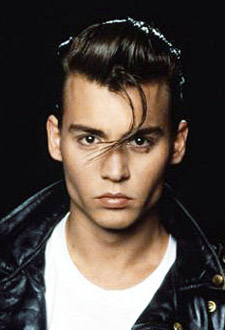 If Johnny Depp was thought of at all in the late '80s, it was as one of the pretty-boy stars of a not terribly respected TV show. The first indication to film fans that young Depp had the stuff to be both a first rate actor and genuine movie star came in John Waters' follow-up to the original "Hairspray," an infectious spoof of teen musicals and exploitation films of the early '50s. As singer and not-so-bad bad boy "Cry-Baby" Walker, Depp delivers a superbly straight-faced send-up of rebellious teen idols like James Dean and Elvis Presley. He dares to romance a pretty society girl (Amy Locane) despite class differences and a scandalously tragic past that causes him to repeatedly shed a single, glycerin tear whenever moved. Depp's flare for deadpan comedy is matched by his rock and roll charisma. "Edward Scissorhands" made Johnny Depp an oddball star not long afterward, but those of us who were paying attention early realized something was up when we saw his hilarious and commanding performance in this thoroughly enjoyable travesty.
If Johnny Depp was thought of at all in the late '80s, it was as one of the pretty-boy stars of a not terribly respected TV show. The first indication to film fans that young Depp had the stuff to be both a first rate actor and genuine movie star came in John Waters' follow-up to the original "Hairspray," an infectious spoof of teen musicals and exploitation films of the early '50s. As singer and not-so-bad bad boy "Cry-Baby" Walker, Depp delivers a superbly straight-faced send-up of rebellious teen idols like James Dean and Elvis Presley. He dares to romance a pretty society girl (Amy Locane) despite class differences and a scandalously tragic past that causes him to repeatedly shed a single, glycerin tear whenever moved. Depp's flare for deadpan comedy is matched by his rock and roll charisma. "Edward Scissorhands" made Johnny Depp an oddball star not long afterward, but those of us who were paying attention early realized something was up when we saw his hilarious and commanding performance in this thoroughly enjoyable travesty.
"Benny & Joon" (1993)
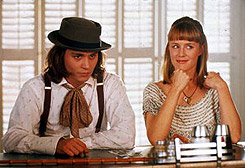 By the early '90s, Johnny Depp was already hard at work reversing his image as a "Tiger Beat" pin-up, and although the offbeat romantic comedy "Benny & Joon," wasn't his first foray into playing one of his trademark oddballs, it's probably the lightest thing he's ever done. As the soft-spoken eccentric who takes a liking to Mary Stuart Masterson's mentally ill Joon, Depp gives remarkable depth to a character that would have likely come off as a one-dimensional clown in the hands of a lesser actor. It's not the fact that he's making grilled cheese sandwiches with a flat iron that's funny, but rather the whimsical curiosity in his eyes as he steam-presses each one with childlike enthusiasm. His character's flair for Buster Keaton and Charlie Chaplin-like theatrics isn't just a way to entertain people, but mask his own shortcomings as well. It's exactly this passion for silent movie-era slapstick that makes the role so memorable, with Depp's impromptu performance in the park (a scene he did without the help of a stunt double) proving just how versatile the actor really is.
By the early '90s, Johnny Depp was already hard at work reversing his image as a "Tiger Beat" pin-up, and although the offbeat romantic comedy "Benny & Joon," wasn't his first foray into playing one of his trademark oddballs, it's probably the lightest thing he's ever done. As the soft-spoken eccentric who takes a liking to Mary Stuart Masterson's mentally ill Joon, Depp gives remarkable depth to a character that would have likely come off as a one-dimensional clown in the hands of a lesser actor. It's not the fact that he's making grilled cheese sandwiches with a flat iron that's funny, but rather the whimsical curiosity in his eyes as he steam-presses each one with childlike enthusiasm. His character's flair for Buster Keaton and Charlie Chaplin-like theatrics isn't just a way to entertain people, but mask his own shortcomings as well. It's exactly this passion for silent movie-era slapstick that makes the role so memorable, with Depp's impromptu performance in the park (a scene he did without the help of a stunt double) proving just how versatile the actor really is.
"What's Eating Gilbert Grape?" (1993)
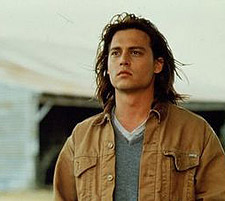 He's the top-billed actor and the movie's title character, but Johnny Depp's work is the last thing most people think of when it comes to "What's Eating Gilbert Grape?" This is no knock on his performance (obviously, or we wouldn't be including it in the list). Instead, it's an observation that while he's the movie's lead, he's not really the star. That would be Leonardo DiCaprio, who stunned the world with his spot-on performance as Gilbert's mentally handicapped little brother Arnie. Still, Depp gets major bonus points for taking his ego out of the equation and doing what's best for the movie simply by being the sun that the other characters revolve around. As a result, he elevates DiCaprio, Juliette Lewis, Mary Steenburgen and newcomer Darlene Carter (as the Grape's morbidly obese mother) to new heights, while turning in a subtle, layered performance of a young man trapped in a one-horse town by his dysfunctional family. It's arguably the least flashy of the performances on this list, but that was sort of the point.
He's the top-billed actor and the movie's title character, but Johnny Depp's work is the last thing most people think of when it comes to "What's Eating Gilbert Grape?" This is no knock on his performance (obviously, or we wouldn't be including it in the list). Instead, it's an observation that while he's the movie's lead, he's not really the star. That would be Leonardo DiCaprio, who stunned the world with his spot-on performance as Gilbert's mentally handicapped little brother Arnie. Still, Depp gets major bonus points for taking his ego out of the equation and doing what's best for the movie simply by being the sun that the other characters revolve around. As a result, he elevates DiCaprio, Juliette Lewis, Mary Steenburgen and newcomer Darlene Carter (as the Grape's morbidly obese mother) to new heights, while turning in a subtle, layered performance of a young man trapped in a one-horse town by his dysfunctional family. It's arguably the least flashy of the performances on this list, but that was sort of the point.
"Ed Wood" (1994)
 Johnny Depp and Tim Burton have forged such a profound partnership over the years that when one mentions Burton's name as the director of a film, it's all but expected that Depp will be the star of said film. Of their collaborations, however, far and away the least commercially successful has been "Ed Wood." But then, what kind of box office boffo would one really anticipate from a biopic about the man often called The Worst Director of All Time? "Ed Wood" scored significant critical acclaim, even earning Martin Landau an Oscar for his performance as Bela Lugosi, but in addition, it also tends to be one of the first films cited when discussing the diversity of roles Depp has played in his career. As Wood, Depp instills the director with an unflagging optimism in the face of every obstacle, and although it's a comedic performance, it's also a sympathetic one that leaves viewers looking at films like "Plan 9 from Outer Space" and "Glen or Glenda?" a little bit differently. Sure, they're still terrible, but now you can imagine a grinning Johnny Depp giving you the thumbs-up from behind the camera, which makes them go down a lot easier.
Johnny Depp and Tim Burton have forged such a profound partnership over the years that when one mentions Burton's name as the director of a film, it's all but expected that Depp will be the star of said film. Of their collaborations, however, far and away the least commercially successful has been "Ed Wood." But then, what kind of box office boffo would one really anticipate from a biopic about the man often called The Worst Director of All Time? "Ed Wood" scored significant critical acclaim, even earning Martin Landau an Oscar for his performance as Bela Lugosi, but in addition, it also tends to be one of the first films cited when discussing the diversity of roles Depp has played in his career. As Wood, Depp instills the director with an unflagging optimism in the face of every obstacle, and although it's a comedic performance, it's also a sympathetic one that leaves viewers looking at films like "Plan 9 from Outer Space" and "Glen or Glenda?" a little bit differently. Sure, they're still terrible, but now you can imagine a grinning Johnny Depp giving you the thumbs-up from behind the camera, which makes them go down a lot easier.
"Dead Man" (1995)
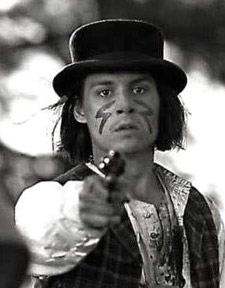 Jim Jarmusch's "acid Western" had some critics shaking their heads, and others reaching for superlatives 15 years back. It certainly offers Johnny Depp plenty of quietly insane moments -- and that's a good thing. "Dead Man" is the story of tweedy accountant William Blake, no relation to the groundbreaking 19th century English poet and artist. Through a series of bizarre traumas, he ends up as an outlaw killer of men and, in some sense, "dead." He makes his way across a bleak black & white landscape with the help of a poetry-loving Native American (Gary Farmer) who decides that this William Blake is the William Blake – even if he is a "stupid fucking white man." Befitting writer-director Jarmusch's deadpan style, Depp gives one of his stranger and more low-key performances, allowing more florid scene partners like the terrific Farmer, Lance Henrickson, John Hurt and, in his final film appearance, Robert Mitchum, to steal scenes as often as need be. Still, the transformation from frontier dweeb to confident killer is handled gracefully and with due force. His performance anchors the film, and it's a film that needs an anchor.
Jim Jarmusch's "acid Western" had some critics shaking their heads, and others reaching for superlatives 15 years back. It certainly offers Johnny Depp plenty of quietly insane moments -- and that's a good thing. "Dead Man" is the story of tweedy accountant William Blake, no relation to the groundbreaking 19th century English poet and artist. Through a series of bizarre traumas, he ends up as an outlaw killer of men and, in some sense, "dead." He makes his way across a bleak black & white landscape with the help of a poetry-loving Native American (Gary Farmer) who decides that this William Blake is the William Blake – even if he is a "stupid fucking white man." Befitting writer-director Jarmusch's deadpan style, Depp gives one of his stranger and more low-key performances, allowing more florid scene partners like the terrific Farmer, Lance Henrickson, John Hurt and, in his final film appearance, Robert Mitchum, to steal scenes as often as need be. Still, the transformation from frontier dweeb to confident killer is handled gracefully and with due force. His performance anchors the film, and it's a film that needs an anchor.
"Donnie Brasco" (1997)
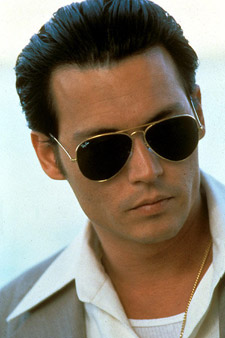 Playing real life undercover detective Joey Pistone, who becomes Donnie Brasco and ingratiates himself with struggling "made guy" Lefty Ruggiero (none other than Al Pacino), for the second time in his career Johnny Depp portrays a cop who traffics in deceit. This time, however, the quality of the material and the stakes are immeasurably higher than "21 Jump Street." Pistone/Brasco's act will endanger his own life and his family's if he fails; if he succeeds, he'll likely cause the death of a Cosa Nostra thief and killer who is also a true friend and a kind of surrogate father. Depp makes the most of this terrifying metaphor for the tightrope that is the acting profession, playing things extremely close to the vest while Pacino relishes the chance to embody the earthy, heart-on-his-sleeve inverse of Michael Corleone. He may be a larger than life, somewhat clownish character but, like us, Ruggiero's an audience who enjoys being taken in by the work of a skilled performer. It's a good thing he's enjoying himself because, as Depp makes clear, every bit of pleasure Pistone receives pretending to be Brasco comes at the cost of a piece of his soul.
Playing real life undercover detective Joey Pistone, who becomes Donnie Brasco and ingratiates himself with struggling "made guy" Lefty Ruggiero (none other than Al Pacino), for the second time in his career Johnny Depp portrays a cop who traffics in deceit. This time, however, the quality of the material and the stakes are immeasurably higher than "21 Jump Street." Pistone/Brasco's act will endanger his own life and his family's if he fails; if he succeeds, he'll likely cause the death of a Cosa Nostra thief and killer who is also a true friend and a kind of surrogate father. Depp makes the most of this terrifying metaphor for the tightrope that is the acting profession, playing things extremely close to the vest while Pacino relishes the chance to embody the earthy, heart-on-his-sleeve inverse of Michael Corleone. He may be a larger than life, somewhat clownish character but, like us, Ruggiero's an audience who enjoys being taken in by the work of a skilled performer. It's a good thing he's enjoying himself because, as Depp makes clear, every bit of pleasure Pistone receives pretending to be Brasco comes at the cost of a piece of his soul.
"Fear & Loathing in Las Vegas" (1998)
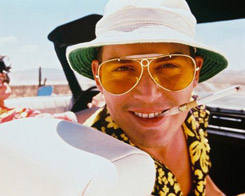 Hunter S. Thompson's most infamous expedition of debauchery sat in Hollywood development hell for more than two decades, reportedly passing through the hands of such notable directors as Martin Scorsese and Oliver Stone without ever reaching lift-off. In the late '90s, however, Thompson met Johnny Depp and decided that he'd found his Raoul Duke. After those nasty ol' "creative differences" led Alex Cox to vacate the director's chair, Terry Gilliam took over the reins. The resulting film was, shall we say, interesting – and by "interesting," we mean that proper appreciation may require pharmaceutical enhancement. There's no question that Depp is Duke, the drug-addled journalist who arrives in Sin City with his trusted legal advisor, Dr. Gonzo (Benicio Del Toro), to cover the Mint 400 motorcycle race, but Gilliam's presentation of their exploits, while true to the original source material, isn't for everyone. Opinions of "Fear and Loathing" vary wildly, ranging from Gene Siskel's "thumbs up" to Mike Clark (of "USA Today") dismissing the film as "simply unwatchable." If you've never seen it, then as your attorney, I advise you to read the book first. Not unlike LSD, it's important to have an idea what you're getting into before you take this trip.
Hunter S. Thompson's most infamous expedition of debauchery sat in Hollywood development hell for more than two decades, reportedly passing through the hands of such notable directors as Martin Scorsese and Oliver Stone without ever reaching lift-off. In the late '90s, however, Thompson met Johnny Depp and decided that he'd found his Raoul Duke. After those nasty ol' "creative differences" led Alex Cox to vacate the director's chair, Terry Gilliam took over the reins. The resulting film was, shall we say, interesting – and by "interesting," we mean that proper appreciation may require pharmaceutical enhancement. There's no question that Depp is Duke, the drug-addled journalist who arrives in Sin City with his trusted legal advisor, Dr. Gonzo (Benicio Del Toro), to cover the Mint 400 motorcycle race, but Gilliam's presentation of their exploits, while true to the original source material, isn't for everyone. Opinions of "Fear and Loathing" vary wildly, ranging from Gene Siskel's "thumbs up" to Mike Clark (of "USA Today") dismissing the film as "simply unwatchable." If you've never seen it, then as your attorney, I advise you to read the book first. Not unlike LSD, it's important to have an idea what you're getting into before you take this trip.
"Sleepy Hollow" (1999)
 There's just a touch of Woody Allen and Bob Hope in Depp's Ichabod Crane. This Crane is not the unpleasant, craven schoolteacher of Washington Irving's original tale, but a scared-out-of-his-wits constable who finds himself in way over his head as he seeks out the truth behind a decapitation-happy and apparently headless horseman. Tim Burton's gruesomely stylized foray into period horror gives Depp a chance to play the kind of hero we rarely see on screen, in that he is entirely fallible but also admirable. Crane might be a bit of a prig, but his heart is in the right place. The believable relationships he forges with Christina Ricci, as the beautiful Katrina von Tassel, and Young Maspeth (Marc Pickering), an orphaned youth who becomes his right hand, allows us to root for him all the more despite his failings, which really aren't that bad. The early 19th century cop might constantly be suppressing paralyzing fear, but that doesn't make for an actual coward. It's easy to face off against monsters if, for some reason, you're not scared of them. A real hero is someone who does the right thing even when frightened beyond all reason.
There's just a touch of Woody Allen and Bob Hope in Depp's Ichabod Crane. This Crane is not the unpleasant, craven schoolteacher of Washington Irving's original tale, but a scared-out-of-his-wits constable who finds himself in way over his head as he seeks out the truth behind a decapitation-happy and apparently headless horseman. Tim Burton's gruesomely stylized foray into period horror gives Depp a chance to play the kind of hero we rarely see on screen, in that he is entirely fallible but also admirable. Crane might be a bit of a prig, but his heart is in the right place. The believable relationships he forges with Christina Ricci, as the beautiful Katrina von Tassel, and Young Maspeth (Marc Pickering), an orphaned youth who becomes his right hand, allows us to root for him all the more despite his failings, which really aren't that bad. The early 19th century cop might constantly be suppressing paralyzing fear, but that doesn't make for an actual coward. It's easy to face off against monsters if, for some reason, you're not scared of them. A real hero is someone who does the right thing even when frightened beyond all reason.
"Blow" (2001)
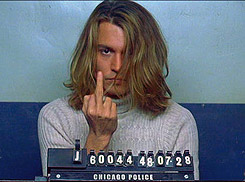 It would take a hell of a film to wrest away the title of "Best Use of Cocaine in a Motion Picture" from "Scarface." Frankly, "Blow" – Ted Demme's final directorial effort – isn't that film. But while it may not offer any lines as instantly memorable as "say hello to my little friend," it is a well-made drama that flows along nicely, finding Depp wearing a variety of wigs as he plays real-like cocaine smuggler George Jung over the course of several years and hairstyles. The supporting cast is also particularly strong, with Ray Liotta and Emma Griffiths portraying Jung's parents, Penelope Cruz and Franka Potente as his love interests, and Ethan Suplee, Paul Reubens and Bobcat Goldthwait turning up as some of Jung's associates (i.e., fellow dealers). What keeps the film from standing alongside its higher-profile coke-centric brethren, however, is that, as Jung, Depp comes across as pretty lethargic. Maybe that's what the real Jung was actually like (given Depp's tendency to lose himself in his roles, we're willing to bet that it was), but the end result is a film with a character who manages to experience countless outrageous moments in his lifetime without coming across as all that exciting himself.
It would take a hell of a film to wrest away the title of "Best Use of Cocaine in a Motion Picture" from "Scarface." Frankly, "Blow" – Ted Demme's final directorial effort – isn't that film. But while it may not offer any lines as instantly memorable as "say hello to my little friend," it is a well-made drama that flows along nicely, finding Depp wearing a variety of wigs as he plays real-like cocaine smuggler George Jung over the course of several years and hairstyles. The supporting cast is also particularly strong, with Ray Liotta and Emma Griffiths portraying Jung's parents, Penelope Cruz and Franka Potente as his love interests, and Ethan Suplee, Paul Reubens and Bobcat Goldthwait turning up as some of Jung's associates (i.e., fellow dealers). What keeps the film from standing alongside its higher-profile coke-centric brethren, however, is that, as Jung, Depp comes across as pretty lethargic. Maybe that's what the real Jung was actually like (given Depp's tendency to lose himself in his roles, we're willing to bet that it was), but the end result is a film with a character who manages to experience countless outrageous moments in his lifetime without coming across as all that exciting himself.
"Once Upon a Time in Mexico" (2003)
 Though it was released only a few months after the blockbuster success of "Pirates of the Caribbean," Johnny Depp still didn't receive top billing in the final installment of Robert Rodriguez's Mexploitation Neo-Western trilogy. That honor went to Antonio Banderas, who, despite reviving his role as the gun-slinging, guitar-strumming El Mariachi, actually plays second fiddle to Depp's Agent Sands for most of the film. As the rogue CIA agent who gets tangled up in a conspiracy plot to assassinate the president of Mexico, Sands is not only the most important character in the film, but he's the most interesting one as well. An arrogant smartass who's so confident that he wears a T-shirt with "CIA" printed in big letters out in public, Depp milks Sands' many eccentricities for all they're worth. From his habit of dressing up in costumes and using a prop arm, to his self-professed love for the slow-roasted pork dish, puerco pibil, Depp is clearly having fun in the no-holds-barred playground that Rodriguez has created. It's definitely not the actor's most memorable role, but it's one that makes the movie better as a result of his involvement.
Though it was released only a few months after the blockbuster success of "Pirates of the Caribbean," Johnny Depp still didn't receive top billing in the final installment of Robert Rodriguez's Mexploitation Neo-Western trilogy. That honor went to Antonio Banderas, who, despite reviving his role as the gun-slinging, guitar-strumming El Mariachi, actually plays second fiddle to Depp's Agent Sands for most of the film. As the rogue CIA agent who gets tangled up in a conspiracy plot to assassinate the president of Mexico, Sands is not only the most important character in the film, but he's the most interesting one as well. An arrogant smartass who's so confident that he wears a T-shirt with "CIA" printed in big letters out in public, Depp milks Sands' many eccentricities for all they're worth. From his habit of dressing up in costumes and using a prop arm, to his self-professed love for the slow-roasted pork dish, puerco pibil, Depp is clearly having fun in the no-holds-barred playground that Rodriguez has created. It's definitely not the actor's most memorable role, but it's one that makes the movie better as a result of his involvement.
You can follow us on Twitter and Facebook for content updates. Also, sign up for our email list for weekly updates and check us out on Google+ as well.











